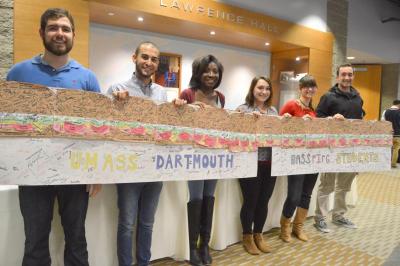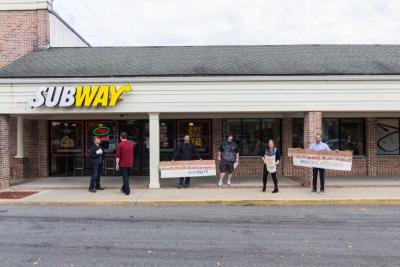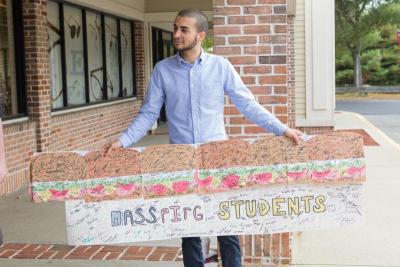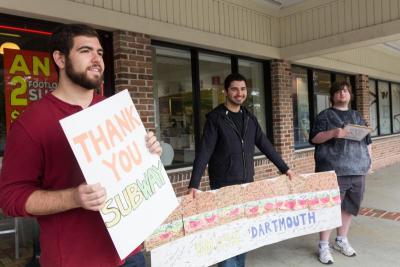Planned protest ends in acts of kindness

It had been in the works for months. Student activists in 50 locations across the country were mounting an effort to protest outside of Subway restaurants on Oct. 22.
While the activists initially planned to inform customers of the dangers of antibiotic overuse in farm animals, something unexpected happened two days before the protest: Subway announced they would be phasing out meat products that have been raised with antibiotics.
The transition will begin in 2016 with chicken. The process of phasing out beef and pork products raised with antibiotics will continue through 2025.
On Thursday afternoon, six UMass Dartmouth students stood outside the Subway at 386 State Road as part of the campaign – but with a different message. The activists thanked the company for changing its policy.
The group is part of the Massachusetts Public Interest Research Group (MASSPIRG), a consumer advocacy group and affiliate of the national organization U.S. PIRG. Their campaign, which started last June, focused on the negative impact antibiotic overuse in food animals can have on human health.
“We’re overusing antibiotics to the point where they’re not working,” said Nathan Broad, who helped organize the student activists. “It’s giving rise to antibiotic-resistant superbugs and bacteria that get people sick and increases the chance that antibiotics won’t work when we need them.”
According to the Center for Disease Control, antibiotics are used commonly in food animals and “may contribute to the development of antibiotic-resistant bacteria.” That bacteria has been known to cause infections in humans.
Antibiotics are sometimes used in commercial farming to promote growth or to stamp out disease amongst livestock. The Center for Disease Control states that antibiotic use in factory farming can’t be stopped altogether due to their use for combatting illness, but “decisions about what antibiotics to use and how to use them must be made with consideration of their potential impact on human health.”
“Our strategy with this campaign is more of a corporate-based strategy,” said Broad. The idea is that if we can get some of the big restaurants that purchase from the factory farms to be the ones leading the way, then we’ll see the factory farms respond to that.”
The group led a similar campaign against McDonald’s late in 2014 that ended in March 2015 when the restaurant chain announced that it would be altering its policy on antibiotic use.
The protestors’ efforts also highlighted how student activism has adapted to the digital age. There was a huge push to share information – and protest – over social media. The group would send out photo petitions, which are images of people holding protest signs that would be sent to Subway directly through the company’s official Twitter account.
“That’s the way you reach college kids,” said Suzy Durling, a campaign coordinator. “They rather see something on their phone than see you standing there in the Campus Center waving them down.”
However, the group also applied more traditional methods like collecting signatures. At UMass, this came in the form of a 12-foot sub made from construction paper and cardboard. The group aimed to have their sub signed by 1,875 students (or about 25 percent of the student population) and nearly reached that goal before the day of action.
When they got word that Subway was changing its policy, the group decided to show up in front of the restaurant anyway. Rather than teaching customers about the dangers of poor farm practices, they planned to share the restaurant chain’s big news.
To reinforce their point, the students created a giant thank-you card.
During the demonstration, two Subway employees came outside to see what was going on. Much to the delight of the students, the employees had their photo taken with the giant sub. They declined comment for this story, however.
“Even though this is a huge development, we haven’t solved the problem quite yet,” said Broad. “Ideally, this should be a wake-up call for restaurants that haven’t made this change.”


















